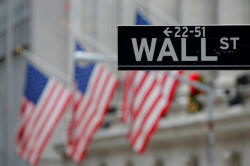U.S. securities regulator grants Wall Street EU research
rules reprieve
 Send a link to a friend
Send a link to a friend
 [October 26, 2017]
By Michelle Price [October 26, 2017]
By Michelle Price
WASHINGTON (Reuters) - The U.S. Securities
and Exchange Commission (SEC) said on Thursday it would grant Wall
Street a 30 month-grace period that will allow them to comply with
sweeping new European Union investment research rules without
overhauling their operations.
The reprieve comes ahead of Europe's MiFID II trading rules, which will
overhaul how investment managers pay for research provided by banks
beginning in January.
Under MiFID II, brokers will have to charge separately for research,
instead of bundling the fees together with other services, such as
trading.
The new rules aim to eliminate conflicts of interest by giving investors
greater transparency over how much they pay banks for discrete services.
EU regulators say this should incentivize brokers to produce better
quality research and allow investors to execute trades with banks that
offer the best price.

Some global investment banks risk losing up to $240 million (£188
million) in business by 2020 under the new rules, according to financial
consultancy Quinlan & Associates.
Many global U.S. brokers servicing European clients will need to comply
with the EU rules, but are technically barred from doing so due to a
quirk of U.S. federal securities law. This sparked concerns that U.S.
brokers would have to overhaul their operations to continue serving
European clients, or EU investors would lose access to valuable U.S.
research.
On Thursday, the SEC issued three so-called 'no action relief' letters
that will allow U.S. market participants to comply with the rules in a
way that is consistent with U.S. law, the regulator said.
[to top of second column] |

A street sign for Wall Street is seen outside the New York Stock
Exchange (NYSE) in Manhattan, New York City, U.S. December 28, 2016.
REUTERS/Andrew Kelly

The letters were drawn up following discussion with the European Union and will
allow the SEC more time to assess how, if at all, it can reconcile its rules
with MiFID.
"Today's no-action relief was designed...to reduce confusion and operational
difficulties that might arise in the transition to MiFID II's research
provisions," SEC Chairman Jay Clayton said in a statement.
"These steps should preserve investor access to research in the near term,
during which the Commission can assess the need for any further action."
Because U.S. and EU firms are the biggest participants in each others' markets,
MiFID has caused a slew of cross-border compliance issues for U.S. firms and
trading platforms across a range of asset classes.
Earlier this month, the U.S. Commodity Futures Trading Commission said it had
reached a preliminary deal with the European Union to recognize each others’
derivatives rules under MiFID II.
(Additional reporting by Pete Schroeder; Editing by Bernadette Baum)
[© 2017 Thomson Reuters. All rights
reserved.] Copyright 2017 Reuters. All rights reserved. This material may not be published,
broadcast, rewritten or redistributed.
 |